7. Star Trek VI: The Undiscovered Country (1991)
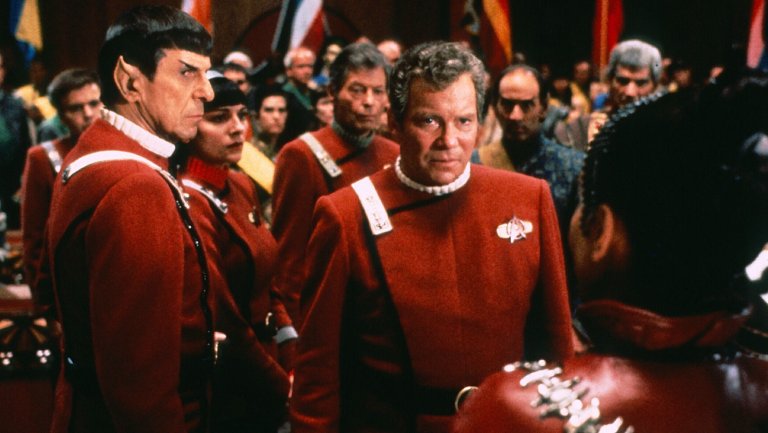
After the backward step that was The Final Frontier, the producers brought back director Nicholas Meyer. He had revitalised the franchise once before and they were counting on him to do the same again. In context, this film was release only a couple of years after the Berlin Wall came down marking the end of the Cold War.
The central idea of The Undiscovered Country was to explore what would happen if the same thing happened in space. Old enemies, the Federation and the Klingon Empire are negotiating a fragile peace accord and there are people on both sides trying their hardest to sabotage it. Stuck in the middle is James T Kirk, battling with his own hatred for the old enemy after they killed his son in a previous film. The film manages to balance these weighty themes with some good comedic moments and it is a far more fitting send off for the original crew of the Enterprise than the previous film would have been.
It is certainly a better way to say goodbye to William Shatner’s inimitable Captain Kirk than the risible Generations mentioned above. Meyer does such great work with the whodunit element of the plot that things rattle along at a good pace. Kirk and McCoy being incarcerated is a little bit of a distraction but ultimately serves its purpose.
The only down side of the film comes with the great Christopher Plummer being given so little to do besides spout random lines from Shakespeare. Concerns were raised by some over the amount of quotations that were worked into his dialogue but the producers felt that it worked. Methinks the character ‘doth protest too much’ but other opinions are available.
6. Star Trek III: The Search for Spock (1984)
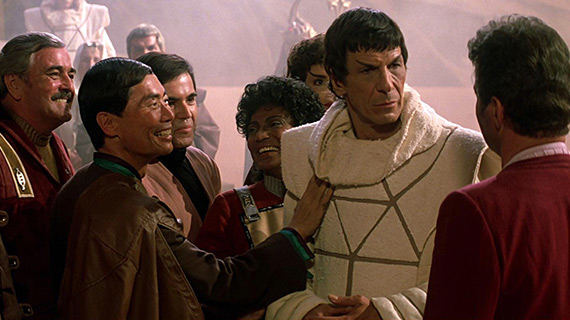
As a direct sequel to the events of Wrath of Khan, we are thrust straight into the crew’s grief at the loss of their shipmate, Spock. We enter an Enterprise never seen before, where it seems that the crew have been beaten. They have survived the battle and averted disaster but have paid a high price which is written on their faces. Kirk himself is a beaten man who seems to be going through the motions. Through a convenient plot device, the crew is given new hope of the chance to bring Spock back.
This seems like one of the biggest plot contrivances of all time and it also cheapens the end of the previous film by immediately doing a U-turn on Spock’s noble sacrifice and it leaves a sour taste in the mouth as you progress through the film. If you can ignore this, however, there are lots and lots of good things about the film. Christopher Lloyd is a fantastic villain, James Horner delivers another great score (sadly his last for the franchise) and there are some quality action scenes.
There is also the tragedy of Kirk’s son being killed. It was a brave decision to include this. Not since the TV episode, ‘City on the Edge of Forever’ had Kirk been put through such a personal horror. This is not the only time the film takes such a step: later in the film, in one of the most memorable sequences, Kirk has no choice but to destroy the USS Enterprise itself. These bold decisions make for a film where there is a real sense of danger at every turn. It’s not without its failings for sure, but it remains a quality entry in the series.
5. Star Trek: First Contact (1996)
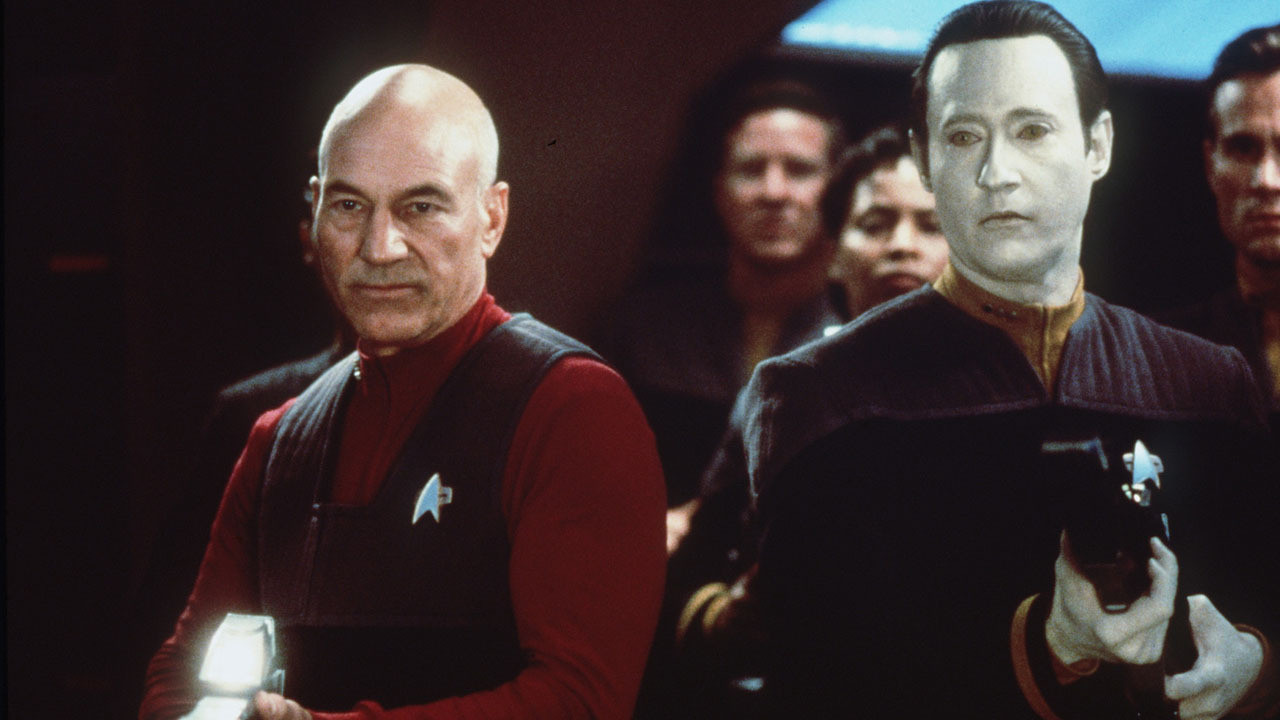
The first solo outing for the Next Generation crew is far and away their best. This is a very well put together film with a strong central idea and a great villain to add menace to proceedings. Star Trek has used time travel many times throughout its history but this is usually done to give reference points for the audience and play with ‘fish out of water’ storylines.
Here, though, the time travel element only takes us back to a place in our own future and it is integral to the plot. That makes it feel like a much more worthwhile venture. There is lots of action, most of which holds up pretty well on repeated viewings and the crew really comes together into a unit, never relying too much on one member to drive the story.
At the heart of the film are great performances by Sir Patrick Stewart and Alfre Woodward as Lily. Alice Krige chews the scenery as the Borg Queen and we even get a great turn from James Cromwell as Zefram Cochran. Ronald D Moore, the man behind the brilliant reboot of Battlestar Galctica, co-wrote the film and his influence is felt greatly throughout. First Contact is considered by many to be one of the best Star Trek films and this is largely down to the story and Picard’s Melville-like quest to destroy the Borg at all costs.
4. Star Trek Beyond (2016)
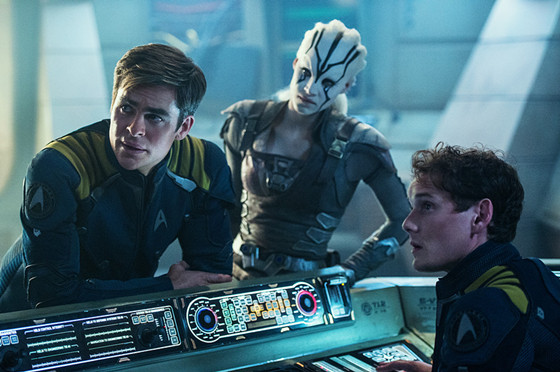
After the disappointment and misfire of Into Darkness, we have this entry: a grand return to the kind of story that the crew of the Enterprise deserve. Gone are the attempts to retrofit plotlines and force homage down the throat of the viewer. Instead we have a briskly paced, self-contained story containing high adventure, excitement and genuine moments of character development.
This film feels like watching all the good bits of the original series but with a big dollop of high-octane action thrown in for good measure. It’s even possible to excuse the inclusion of the Beatie Boys’ ‘Sabotage’ as it has a key use in the plot. There is a great villain in Krall (always good to see Idris Elba, even if he is caked in latex) and a genuinely precarious situation for the crew that has you on the edge of your seat.
Director Justin Lin, better known for his entries in the Fast and Furious franchise, does take a couple of missteps including a motorcycle scene that feels a bit too much but largely what this film does well it does really well.
Plus, it’s fun. That’s what was unceremoniously removed in Into Darkness. The new actors playing old roles have settled into them brilliantly and the future of the movie franchise looks to be safe. Simon Pegg, Karl Urban, Zoe Saldana and Zachary Quinto all deserve high praise for re-inventing their roles while being true to the original source material.
3. Star Trek (2009)
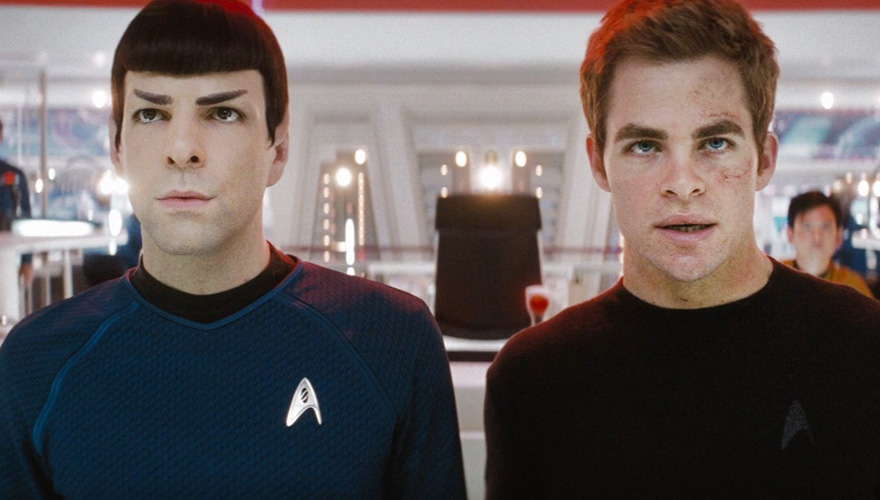
JJ Abrams’ reboot of the Star trek universe was fraught with risks from its inception. To replace the actors who had, for more than 40 years, made cultural icons of themselves was going to be a hard sell to the public. Those old enough to remember the original crew would be loathe to accept change and the young audience, lacking prior knowledge, would have to be sold the characters from scratch.
The Star Trek universe, as it stood, was overrun with lore and continuity that would make any tinkering potentially disastrous and lead to a fan revolt. The way Abrams and the writers approached this was a revelation. They managed to sidestep the entire problem by creating an alternate timeline that would allow any number of things to be reworked, to the point of destroying the entire planet Vulcan. In creating this alternate stream, the writers bought themselves some much needed breathing space in which they could experiment with changing dynamics and working characters into slightly new situations.
Time Travel is a well-worn staple in Star Trek and here we see the Butterfly Effect put to good use to create an entirely new life for the crew of the Enterprise. Zachary Quinto and Karl Urban are the most successful in channelling their predecessors and this is very welcome. Chris Pine had perhaps the hardest job of all in trying to reinvent Captain Kirk. Pine doesn’t go the same way as the others in that he puts his own spin on the role from the outset. This is a wise move which pays off well.
The film has a great, action-packed plot and some fabulous set pieces. The special effects, which were looking rather tired in the previous film, are brought firmly into the 21st Century. This was also the first ever Star Trek film to win an Academy Award, for Best Makeup. All in all, it’s a fine continuation of the series and a thoroughly entertaining film in its own right.
2. Star Trek IV: The Voyage Home (1986)

Few films in the series are as much fun as Leonard Nimoy’s second outing as director. After the grand space drama of the previous two films, we are brought back to a very simple story that resonates with the feel of the original series. It’s a time travel story with a strong environmental message from a time when such films were not as commonplace as you might imagine.
The crew are flung into a ‘fish out of water’ story in which they must navigate the confusing world of 1980s San Francisco and the results are heart-warming, funny and never feel forced. Unhappy with the first draft of the script, the producers called in Nicholas Meyer (who had enjoyed so much success and acclaim with The Wrath of Khan) to work on aspects of it with writers Harve Bennett and Leonard Nimoy.
At one point, comedian Eddie Murphy, who was a big Star Trek fan, was destined to have a prominent role in the film; however he didn’t like what had been written for him and left the project. Meyer, according to Nimoy, was responsible for lots of the humour and social commentary in the middle portion of the film. What came out of all the wrangling was a great story that had a very positive reaction from Star Trek fans and even from general audiences due to its accessibility as a story.
1. Star Trek II: The Wrath of Khan (1982)
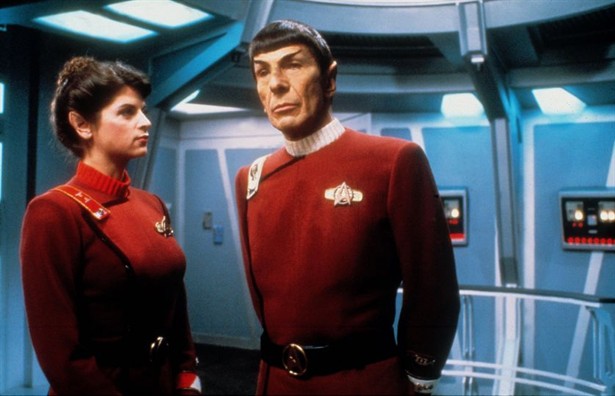
The distance between this film and The Voyage Home is immeasurable. Beyond being the finest Star Trek film ever made, it stands out as one of the great science fiction films of the 1980s. Director Nicholas Meyer, despite never having seen a single episode of the original series, managed to recapture all that was enjoyable about it while adding just the right amount of menace to create a genuinely nerve-shredding experience. He completed the final script himself, piecing together lots of other people’s work in under two weeks and didn’t take credit or pay for it.
Star Trek fans the work over should be rejoicing that he is part of the writing team on the upcoming series, Star Trek: Discovery. The choice of returning to Ricardo Montalban’s titular villain, Khan Noonien Singh who only appeared in one episode, was a stroke of genius which cemented the themes that the film wished to explore. Meyer wanted to make a film reminiscent of the Hornblower stories and there was a fair amount of nautical references thrown in, including Khan’s Captain Ahab quotes.
The look of the film was also completely overhauled after The Motion Picture. For example, the Starfleet uniforms were redesigned for a more naval feel that stayed with the series all the way up to First Contact. The production team could not afford to bring back Jerry Goldsmith to do the score so they opted for a young, largely unknown composer called James Horner. The score he produced for the film was top notch and remains the best of the series, underpinning all the excitement and drama of the film and eliciting emotional responses by the bucketload.
In short, The Wrath of Khan is a story about dealing with the mistakes of the past; living up to your own responsibilities. Kirk comes face to face with a stern reminder of the consequences of his actions and is sorely tested as any good hero should be. Shatner brings some of his finest work to the table in Wrath of Khan, which is a relentless feast of entertainment. It has humour, action and tragedy in perfect balance and stands the test of time as the definitive Star Trek film.
Author Bio: Richard Austin is a Primary School Deputy Headteacher who’s just finished his first novel and is saving up to get it edited. When he was a kid, he used to keep a little book of the films he went to see at the cinema, giving them ratings out of 5, which his family and friends find highly amusing to this day! He also has a website where he writes his random thoughts about science fiction.